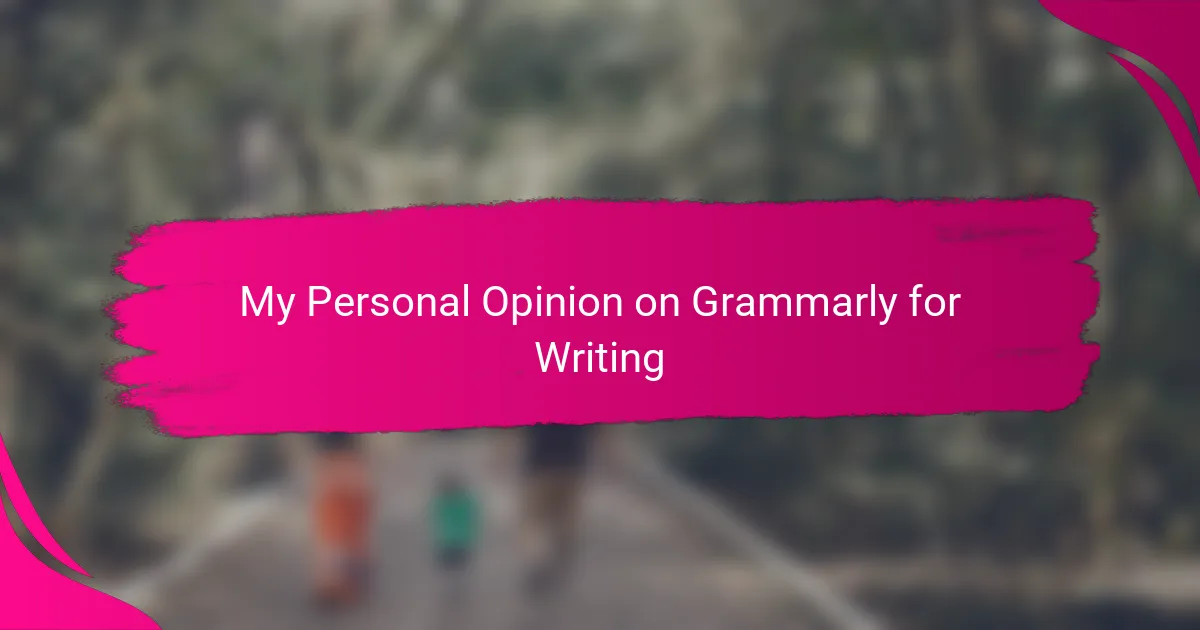Key takeaways
- Grammarly acts as a supportive tool, enhancing writing clarity while educating users on grammar rules, beneficial for both personal expression and teaching children.
- It boosts confidence in parenting communications by helping craft clear, empathetic messages, thereby improving relationships with teachers and other parents.
- Users should carefully review Grammarly’s suggestions to maintain their unique writing voice and context, especially in sensitive parenting matters.
- While Grammarly is effective, it may overlook emotional nuances in parenting communication that require personal empathy and understanding.
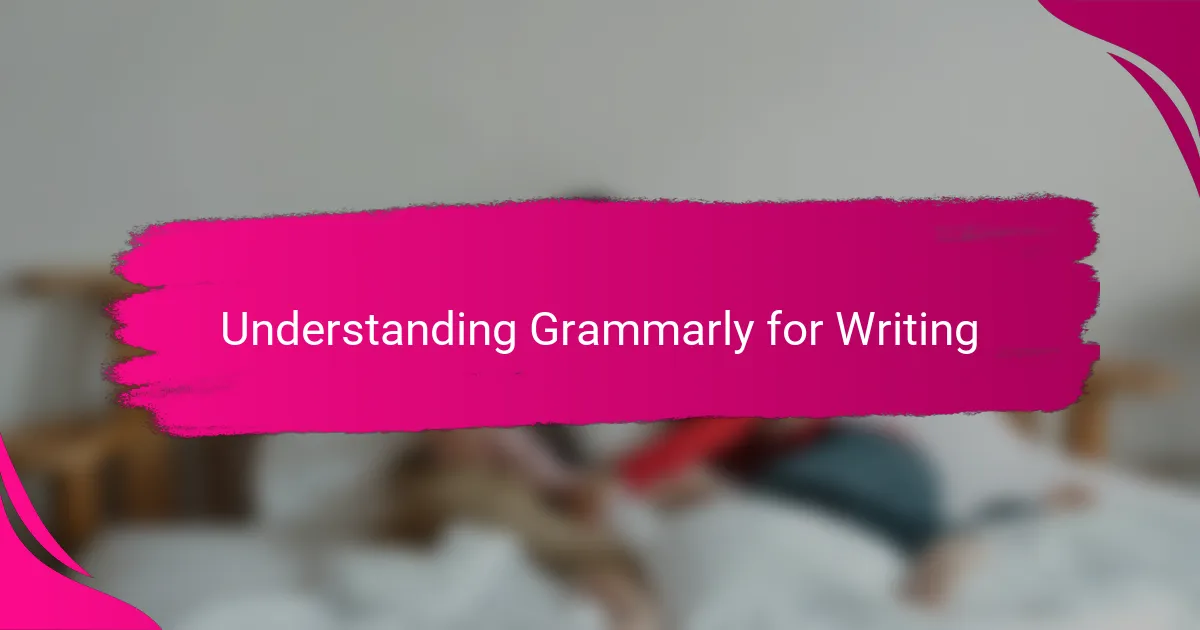
Understanding Grammarly for Writing
When I first started using Grammarly for writing, I was curious if it would really catch my mistakes or just overwhelm me with suggestions. It turns out, Grammarly is more like a helpful friend who gently points out errors and offers clearer alternatives without making me feel judged. Have you ever wondered how much a simple spelling or grammar check could improve your confidence in writing?
What makes Grammarly stand out to me is its ability to explain the “why” behind each correction. As a parent, I appreciate how this can translate to helping my kids understand the rules of grammar rather than just fixing their mistakes for them. It’s reassuring to know that the tool doesn’t just fix errors but also teaches, which aligns with how I try to guide my children’s learning process.
Sometimes, I catch myself debating whether to accept Grammarly’s suggestions or keep my original phrasing, especially when writing something personal. This part of the experience reminds me that writing is as much about expression as it is about correctness. Have you ever felt torn between sounding perfect and staying true to your own voice? Grammarly encourages that balance by offering options, not ultimatums.
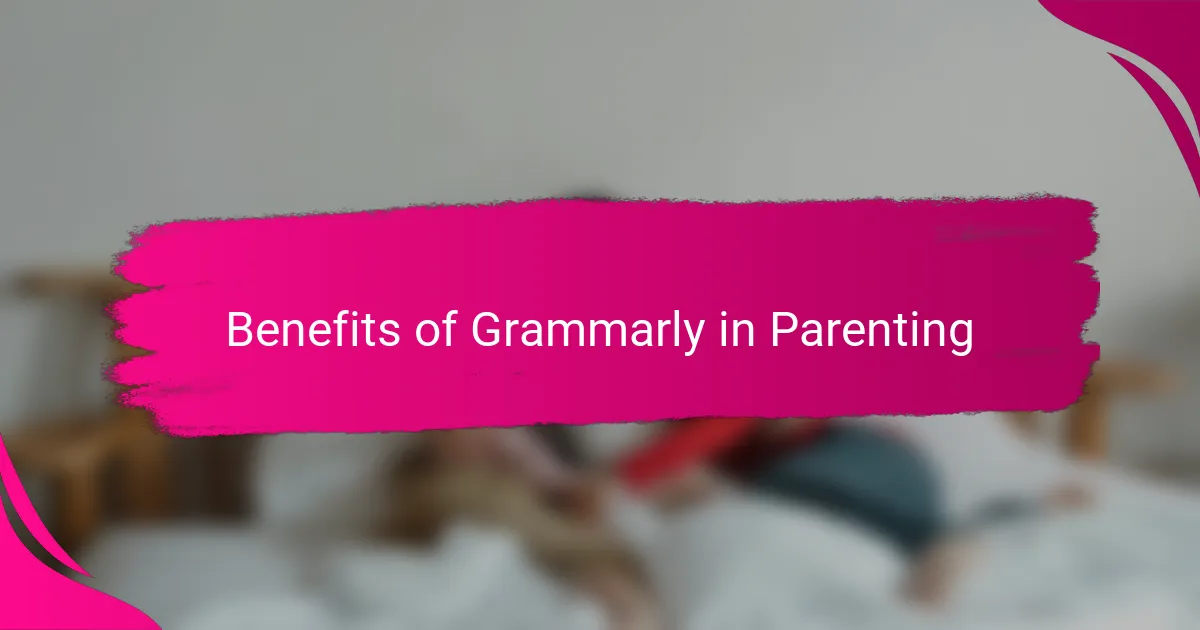
Benefits of Grammarly in Parenting
Grammarly has been a game changer for me in managing the countless notes, emails, and permission slips that come with parenting. I used to worry about making careless mistakes that might confuse teachers or other parents. Now, I feel more confident knowing that my messages are clear and polished, which saves me from unnecessary follow-ups.
One surprising benefit I’ve noticed is how Grammarly subtly encourages me to model good writing habits for my kids. When I share corrected messages or essays, they start noticing the grammar tips themselves. Have you ever thought about how your own writing tools could quietly influence your children’s learning without forcing lessons on them?
Sometimes, the real magic happens when Grammarly helps me choose kinder, more empathetic words in sensitive situations—like addressing a teacher or resolving conflicts with other parents. It’s like having a thoughtful assistant who reminds me that good communication in parenting isn’t just about correctness but also tone and care. Have you experienced how a single word change can smooth over a tricky conversation?
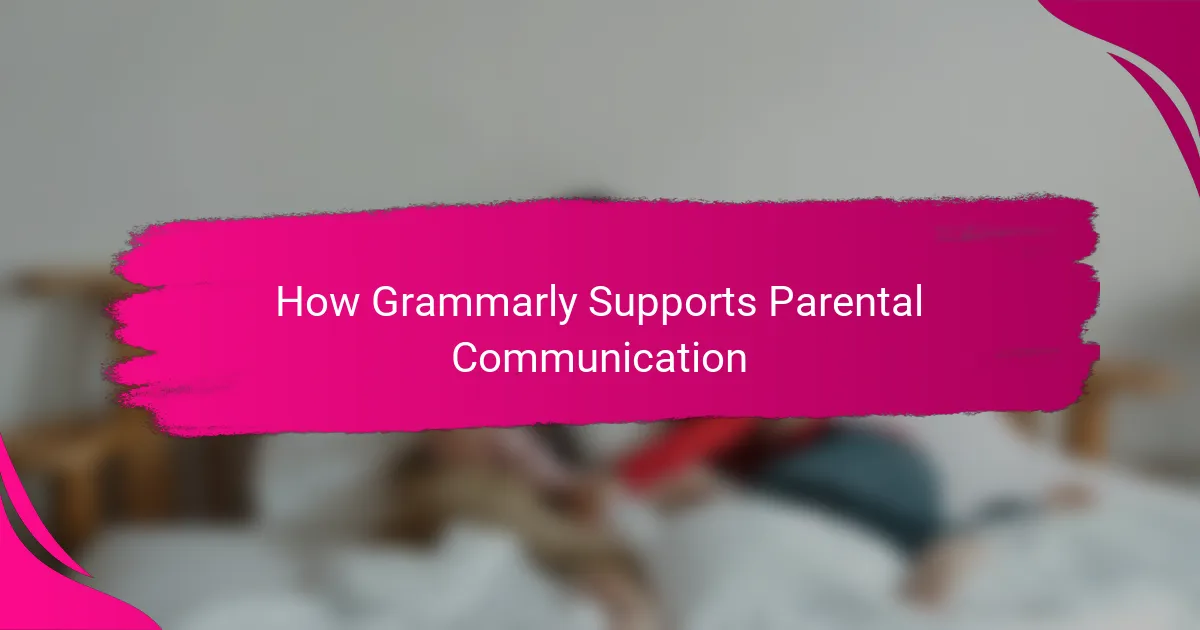
How Grammarly Supports Parental Communication
Grammarly has truly changed the way I communicate with my child’s school. I used to second-guess every email, worrying if my message sounded too harsh or unclear. Now, I trust Grammarly to help me strike the right tone, so my concerns come across clearly but kindly—something every parent needs when interacting with teachers.
I also appreciate how Grammarly simplifies tricky phrasing when I’m coordinating with other parents, especially during busy event planning. It feels like having a patient editor who helps me avoid misunderstandings, which often arise from rushed or unclear messages. Have you ever noticed how a slight wording tweak can transform a confusing text into something everyone appreciates?
What stands out most to me is how Grammarly’s support goes beyond grammar. It nudges me toward empathy and clarity, which are essential when juggling the many conversations a parent faces daily. I find myself more thoughtful about my words, knowing they can impact relationships that are so important to my family’s everyday life.

Personal Experience Using Grammarly
Using Grammarly has felt like having a reliable writing partner by my side, especially during those hectic moments when I’m typing out a quick message between parenting duties. I remember once sending a note to a teacher that I worried might sound too abrupt, but Grammarly’s suggestions helped me soften the tone without losing clarity. Have you ever wished for a tool that could catch not just mistakes but also your tone in real time?
There was a time when I hesitated to rely on Grammarly fully because I worried it might strip away my personal style. However, I soon realized that it offers choices rather than imposing rules, letting me decide which suggestions fit my voice. This balance makes me feel more confident, knowing my writing stays authentically mine while becoming clearer.
What surprised me most is how using Grammarly has subtly improved my own understanding of grammar and style—something I hadn’t expected. It’s like learning alongside the tool, which makes me feel better equipped to help my kids with their writing homework. Have you noticed how teaching yourself sometimes starts with little moments like these?

Tips for Using Grammarly Effectively
One tip I’ve found essential is to review Grammarly’s suggestions carefully instead of accepting them all blindly. Sometimes, the tool offers changes that don’t quite fit my intended meaning or style. Have you ever caught yourself altering a perfectly fine sentence just because a red underline appeared? Taking a moment to decide keeps your voice authentic while still benefiting from the corrections.
Another strategy that’s worked well for me is to customize Grammarly’s settings based on the type of writing I’m doing. When I’m drafting a casual note to another parent, I don’t need the formality level that I might want for an email to a teacher. Adjusting these preferences helps the suggestions feel more relevant and less intrusive—like getting advice tailored just for my needs.
Lastly, I find it helpful to use Grammarly as a learning tool by reading the explanations behind each correction. Instead of just fixing my errors, I try to understand why something needs changing. Over time, this has improved not only my writing but also how I guide my kids when they’re working on their homework. Are there tools you’ve used that have doubled as both helpers and teachers? Grammarly certainly fits that role for me.
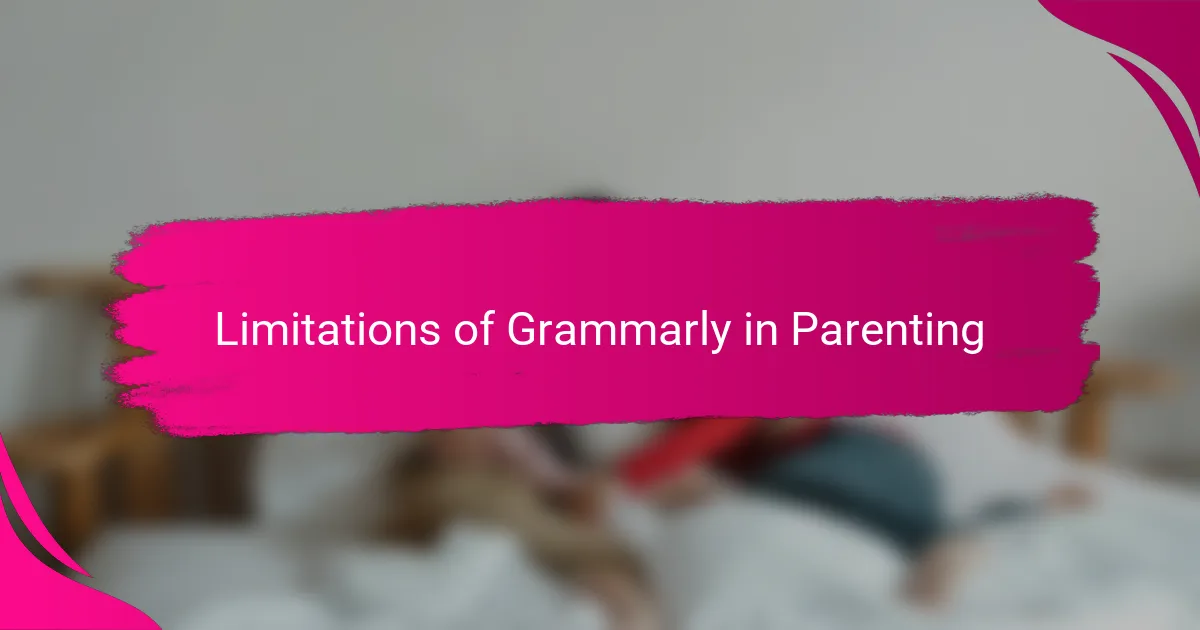
Limitations of Grammarly in Parenting
While Grammarly is great, I’ve noticed it sometimes misses the context unique to parenting communication. For instance, when I’m writing a heartfelt note about my child’s progress, Grammarly might flag informal expressions that actually convey warmth and authenticity. Have you ever felt that a strict grammar correction can unintentionally sterilize your message’s emotional tone?
Another limitation is that Grammarly can’t always detect nuances in tone specific to sensitive parenting topics. I once relied on it to polish a difficult message about behavioral concerns, but it didn’t catch how some phrases might come across as too direct or harsh. This made me realize that no tool can replace the empathy and judgment a parent brings when choosing their words carefully.
Also, Grammarly’s suggestions sometimes feel generic, especially when I want to keep my unique voice in parenting communications. It’s like having a helpful editor who doesn’t quite understand the special language developed between parents, teachers, and kids. Don’t you find that sometimes only a fellow parent truly gets the delicate balance of clarity, kindness, and real-life tone?
